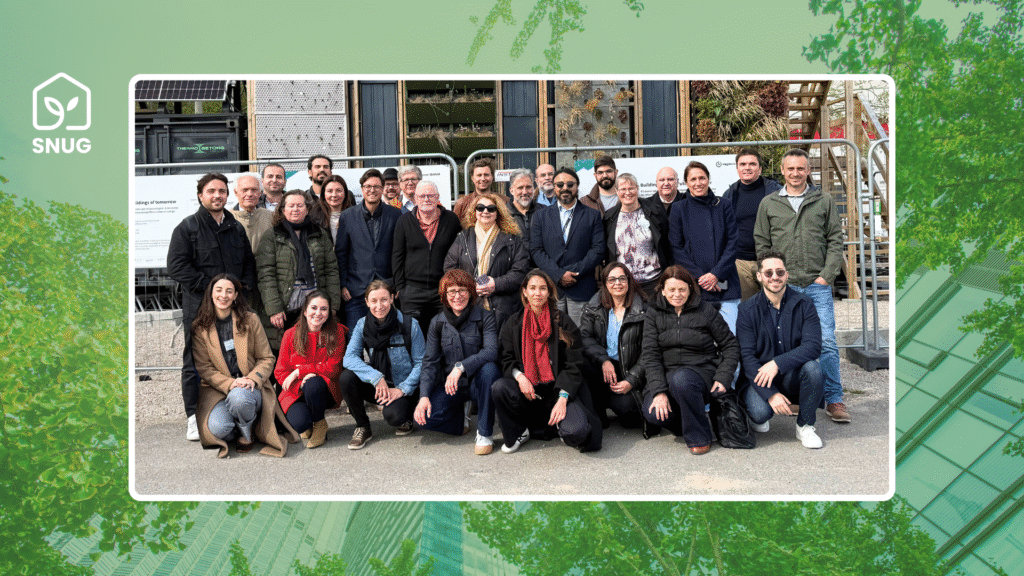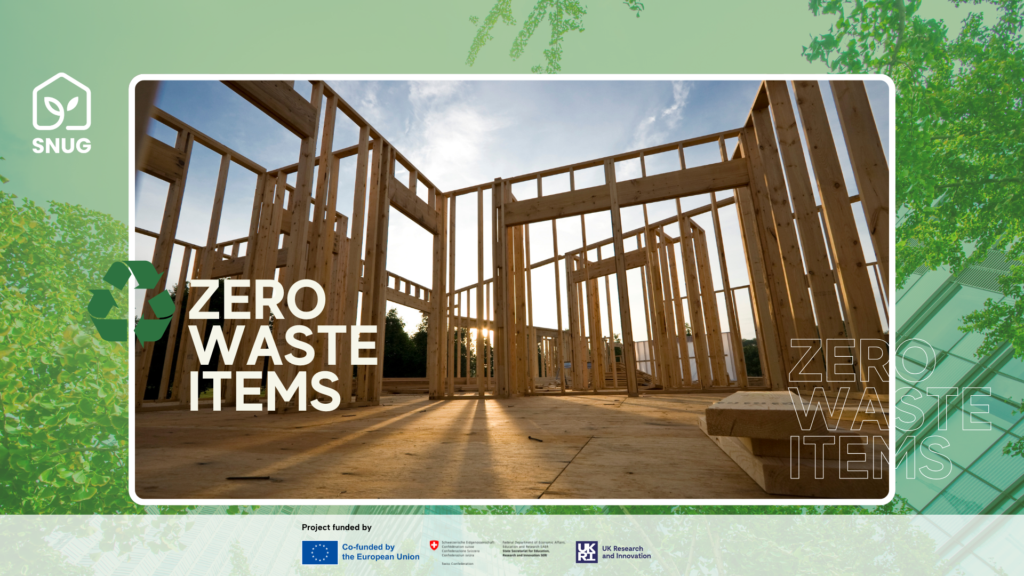Introducing SNUG Biobased Insulation Solution!
We are excited to introduce an exciting innovation in sustainable construction – the Hemp and Tannins-based Resin Insulation Panel. In today’s world, where sustainability is more critical than ever, biobased insulation panels are an essential part of the solution to reduce carbon footprints and promote eco-friendly building practices. This cutting-edge product combines the best of nature and technology, offering an effective, green alternative to traditional insulation materials without sacrificing performance.
Designed specifically for External Thermal Insulation Composite Systems (ETICS), the SNUG panel offers excellent thermal insulation properties. To further enhance its sustainability, the panel is wrapped in a recycled skin mortar, developed through a collaboration between CTCON and AIDIMME, optimizing both its environmental impact and overall performance.
The development of this product is the result of a dynamic collaboration among leading industry experts:
CRES – Supplier of some natural fibres
The Centre for Renewable Energy Sources and Saving (CRES) is Greece’s national entity dedicated to promoting renewable energy, energy efficiency, and conservation. In line with national and EU policies, CRES actively contributes to environmental protection and sustainable development, implementing innovative projects to drive the market adoption of new energy technologies.
CRES embarked on a comprehensive journey to understand market needs and opportunities by conducting an in-depth literature review and creating a Stakeholder Interviews Survey. This initiative engaged key industry players to identify the essential requirements for thermal insulation materials. With these valuable insights, CRES set out to explore the potential of biomass waste as a sustainable insulation solution. Researchers carefully examined various biomass sources, assessed their thermal properties, and prepared samples for rigorous laboratory testing. This pioneering work not only advances green building technologies but also lays the foundation for a more sustainable construction sector, helping to reduce waste and improve energy efficiency.
CHIMAR – Experts in adhesive formulation
CHIMAR Hellas is an innovative R&D SME specializing in chemical technologies and services for industrial adhesives and composite wood-based panels used in furniture, construction, and insulation. Since the 1990s, CHIMAR has pioneered bio-based adhesives, replacing petrochemical feedstocks with renewable materials. CHIMAR expertise extends to developing novel bio-composite panels using agricultural and industrial residues, as well as recycled materials.
As part of the SNUG project, CHIMAR has developed bio-based adhesives using natural raw materials such as tannin, lignin, and soy protein. These adhesives contain between 30% and over 90% bio-based content. Their properties were analyzed in CHIMAR laboratories, and their adhesive performance was tested by producing lightweight particleboard panels from diverse biomass sources, including pine, lemon tree wood, Posidonia oceanica, hemp, rice husks, sunflower residues, and corn cobs. The panels were manufactured under simulated industrial conditions and assessed according to European standards.
The results showed that most bio-based adhesives successfully produced high-performance panels. Notably, tannin-based resins demonstrated outstanding results when used in hemp-based panel production. CHIMAR’s advancements in bio-based adhesives contribute to sustainable and eco-friendly alternatives for the wood composite industry, promoting reduced reliance on petrochemicals and enhanced environmental sustainability.
AIDIMME – Specialists in fabrication protocols and material characterisation
AIDIMME Technology Institute, has the professionals, laboratories and tools to manufacture plant fibre panels on a laboratory and pilot scale using the hot plate pressing process. As well as carrying out an in-depth analysis of their properties, such as: mechanical, reaction to fire, acoustic, chemical and durability.
As part of the SNUG project, many trials have been carried out here in AIDIMME of the biopanels fabrication and dosage, in order to reach the best option to scale up for the industrialization stage. For this activity we have also taken the responsibility of characterizing these panels in the different properties that the construction sector regulations order in the case of insulating materials.
In other activities we are working hand in hand with CTCON to develop the best recycled mortar dosage for the outer skin of the construction solution. Furthermore, the attachment system should be studied, so a constructive element will be developed after all these mentioned stages with the objective of being installed in the different demo sites.
KEAS – Pioneers in industrialisation
Kastamonu Entegre (KEAS), a leading manufacturer in the wood-based panel sector, operates five strategically located production facilities across Türkiye. With an international presence spanning five countries, including Türkiye, Romania, Bulgaria, Bosnia and Herzegovina, and Italy, the company ranks among the top three producers in Europe. Kastamonu Entegre holds a substantial global market share in the production of medium-density fibreboard (MDF), particleboard (PB), laminate flooring, and door panels. Further demonstrating its global leadership, the company stands as the largest Turkish investor in Italy.
KEAS manufactures hemp biopanels using tannin-based adhesives. While hemp fibre is utilized within the textile industry, hemp shives offer a sustainable alternative to wood. Notably, hemp shives exhibit a lower bulk density compared to wood. This characteristic enables the production of lighter-weight boards. At KEAS, we aim to leverage this property to develop boards with enhanced insulation performance. Furthermore, the use of hemp shives aligns with the principles of industrial symbiosis, as they are a byproduct of the textile sector. However, the difference in density between hemp shives and wood necessitates adjustments in the production line. KEAS is actively engaged in integrating hemp shives into existing industrial processes as a substitute for wood.
Why This Matters:
This Hemp and Tannins-based Resin Insulation Panel isn’t just a step forward in construction—it represents a meaningful leap toward a more sustainable and environmentally-conscious future for the built environment. Here’s why it’s so important:
- Biobased & Eco-friendly: By utilizing hemp and tannins, two naturally occurring and renewable materials, we are reducing our reliance on petrochemical-based products typically used in construction. Hemp, in particular, grows quickly with minimal water, pesticides, or fertilizers, making it one of the most sustainable materials available today. Tannins, extracted from plant sources, also have excellent adhesive properties, replacing synthetic resins and contributing to a greener, more sustainable construction process.
- High-Performance Insulation: This new insulation panel goes beyond just being eco-friendly; it is designed for high performance. It helps to significantly improve the energy efficiency of buildings by reducing heat loss, making indoor spaces more comfortable while lowering energy consumption. Better insulation means less reliance on heating and cooling systems, which in turn reduces greenhouse gas emissions. This is a key component in the fight against climate change, as buildings are one of the largest contributors to global carbon emissions.
- Recycled Skin Mortar: The panel’s outer layer is made from recycled materials, thanks to the development of innovative recycled skin mortar by CTCON and AIDIMME. This not only reduces the amount of waste entering landfills but also follows the principles of a circular economy, where materials are reused and recycled to extend their lifecycle. The integration of recycled materials into the construction process ensures that the building industry is contributing less to resource depletion and waste generation.
Images credits: Canva Pro
In essence, this panel embodies the future of sustainable construction: combining natural materials, cutting-edge technology, and circular economy principles to create a product that is both high-performing and environmentally responsible. By adopting solutions like this, we can make a significant impact on reducing the environmental footprint of buildings, creating healthier spaces for people, and working toward a more sustainable world.
What is Coming Next?
We are now moving into the testing phase, where we will evaluate the bonding properties between the biobased panel and the recycled mortar skin. Our next challenge? Designing the best method to attach these panels securely to existing building facades.
Stay tuned for more updates as we continue to push the boundaries of sustainable construction! Subscribe to our newsletter to follow SNUG’s journey!
















